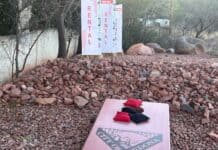Since Arizona leaders first began shutting down businesses and public facilities five months ago, the state has seen the rise and fall of COVID-19 infections.
Arizona’s Rt, or rate of transmission, has been under 1.0 since June 24 and has almost consistently been the lowest in the country since mid-July.
The rate of newly reported daily cases — 500 to 700 — has fallen to an average we had in late May. Arizona’s peak of new daily cases was 5,484 on June 27 and the peak number of deaths in a single day was weeks later, with 97, on July 17.
One could argue that mask mandates reduce the spread, but when comparing areas like Sedona, Flagstaff, Cottonwood and Clarkdale that have mask mandates with nearby areas that do not, such Camp Verde, Prescott, Prescott Valley and unincorporated Yavapai County, these rates of infection are on par. It would be thus inaccurate then to make that claim.
That said, there are plenty of people in mask-mandated areas that do not, cannot or will not wear masks or simply wear them poorly. Likewise, there are plenty of people in areas without any mask mandates who choose to wear them and have for months.
Making an objective measurement would be impossible outside of laboratory conditions to accommodate for all the other factors and vectors affecting this strategy.
Masks prevent the spread from already infected people to others certainly, but they also psychologically give people a false sense of safety and security even when the masks they choose to wear are ineffective or poorly worn.
More likely is the fact that people choose to socially distance and avoid public places. Grocery stores and big box retailers have reported a drop in sales due in part to the fact that people are spending less time in necessary stores and avoid others if they can obtain the same products online or via outside pick-up.
That said, Arizona Gov. Doug Ducey has wasted no time claiming his actions as governor have had a profound impact on state spread. However, Ducey has really done nothing meaningful. Ducey issued an order suggesting people stay home in April, but gave it no teeth and lifted it 30 days later when it was not a magic cure, caused more economic damage than medical good, and when the political heat to “do something, anything” evaporated.
During that closure, Ducey did nothing to increase testing or secure medical equipment, did not increase the number of contact tracers and did not call on the Arizona State Legislature to boost unemployment benefits so working class Arizonans — especially those in the service industry that see hundreds of customers daily — could afford to stay home and avoid public contact.
The one act Ducey champions is the decision to mandate masks, but he really issued no such order, instead delegating it to local officials, thus he could avoid the responsibility of irking people in favor or against masks while taking credit if masks reduced the spread.
He issued that order on June 17, but daily infections continued to increase for two-and-a-half weeks.
The shuttering of certain types of businesses to protect public health also seems disingenuous when other identical businesses can remain open.
Ducey closed bars, theaters, water parks and river tubing because Phoenix television stations cited large crowds at these venues in news stories criticizing the governor’s inaction.
Of these, river tubing is perhaps the most absurd because the governor’s subsequent action did not prevent the activity wholesale, just the businesses running tubing operations. A group of friends could still put in the Salt River and get picked up downriver. Besides, if tubers are within six feet of another group of strangers tubing down the river, they’re doing it wrong.
Ducey closing two types of bars while restaurants remained open for hundreds of unmasked, possibly asymptomatic people per day also seems absurd. Patrons cannot go into a bar and order a drink because it is a deadly health risk but they can go into a restaurant, sit at an identical bar and order a drink.
The decision to close bars was purely political on Ducey’s part and had absolutely nothing to do with real conditions in these establishments and their analogues.
Without control conditions in a scientific study, it is impossible to determine if any particular measure or tactic cut the rate of infection. Rather, it is a mixture of all these methods combined with human behavior that has likely reduced our state’s infection rates.
In any case, to quote Ducey’s most tired, overused, predictable and meaningless cliche, “this is not a victory lap,” but whatever tactics Arizonans are doing seem to be working, so stay the course.
Christopher Fox Graham
Managing Editor






















